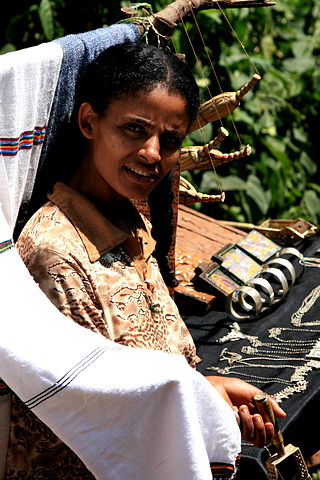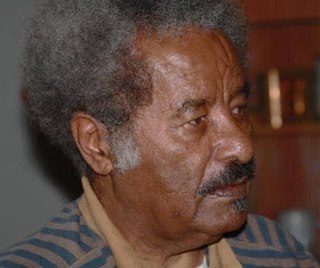
Amharas are a Semitic-speaking ethnic group indigenous to Ethiopia, traditionally inhabiting parts of the northwest Highlands of Ethiopia, particularly inhabiting the Amhara Region. According to the 2007 national census, Amharas numbered 19,867,817 individuals, comprising 26.9% of Ethiopia's population, and they are mostly Oriental Orthodox Christian.

The begena, is a ten-stringed box-lyre instrument from Ethiopia, and is the sole melodic instrument devoted only to the zema, the spiritual part of Ethiopian music.

Mesfin Woldemariam was an Ethiopian academic and human rights activist.

Adama City Football Club is an Ethiopian professional football club based in Adama, Oromia Region. The club was founded in 1991 and currently competes in the Ethiopian Premier League, the top division of Ethiopian football. Adama City has a consistent appearance in the league except the one year where the team went to relegation. Best times are when the team finishing second in 2008 and staying on top of the league on 2017–18 for a while which ended at being 5th. The women team have won the title on 2018–19 with Loza Abera and Senaf Wakuma winning the golden ball and boot respectively.

The Ethiopian Broadcasting Corporation, now rebranded as ETV, is an Ethiopian government-owned public service broadcaster. It is headquartered in Addis Ababa, Ethiopia, and is the country's oldest and largest broadcaster.

Nahom Mesfin Tariku is an Ethiopian runner who specialized in the 3000 metres steeplechase. He competed at the Summer Olympics in 2008 and 2012. He was born in Dila.

Abe Gubegna was an Ethiopian writer. His name is sometimes spelled "Abbé" or "Abbie". He published eight novels, five plays, three collections of poetry, and translated several biographies of world leaders as well as other works. Abe mainly wrote in Amharic, but two of his books were written in English.

Temesgen Desalegn is an Ethiopian journalist. As an editor of the independent weekly newspaper Feteh, Desalegn went to court many times and was imprisoned from 2014 to 2017 as a result of his criticism of the national government, drawing protests on his behalf from the international press freedom groups Committee to Protect Journalists and Article 19 and from Amnesty International. In its 2014 report, the U.S. Department of State also reported its concern against Temsgen's 3 years sentence by the government, emphasizing that Freedom of expression and freedom of the press are fundamental elements of a democratic society and government. The Human Rights Watch also reported his charge in August 2012 and his three years sentence in 2014.

The Zone 9 bloggers are a blogging collective from Ethiopia, who maintain a blog in Amharic. On 25 and 26 April 2014, the Ethiopian government arrested six members of the Zone 9 bloggers network and three other journalists, who faced terrorism charges for their writing at the time. The action had sparked an online protest.

Zeritu Kebede is an Ethiopian singer, songwriter, and actress. A prominent figure in modern Ethiopian music, her songs often incorporate rock and gospel music.

The Cinema of Ethiopia and the film industry in general are relatively recent phenomena in Ethiopia. The Ethiopian film industry is growing but faces many problems that have prevented it from fully flourishing. Historically, live stage theater enjoyed more popularity in Ethiopia, creating a handful of relatively successful stage actors. Ethiopian films began modernizing in the 2000s, implementing Amharic, but due to wide home video and DVD distribution, they are often frustrated by copyright infringement in the presence of piracy. This was reduced in the early 2010s with the intervention of the government and the imposition of policy. Despite recent developments, the Ethiopian film industry continues to lack quality compared to modern world cinema and has a low budget amateurish style.
Nebiy Mekonnen was an Ethiopian poet, journalist, playwright, and translator. He was also the co-founder and editor-in-chief of the weekly newspaper Addis Admas. He is known for translating Gone with the Wind into Amharic onto three thousand cigarette-paper pieces while imprisoned. His translation is titled Negem Lela Ken New or Tomorrow is Another Day. At the time of its publication, it was one of the longest books ever published in Amharic.

Running Against the Wind is a 2019 Ethiopian drama film directed by Jan Philipp Weyl. It was selected as the Ethiopian entry for the Best International Feature Film at the 92nd Academy Awards, but it was not nominated.

Getachew Reda Kahsay is an Ethiopian politician who is the Chief Administrator of the Interim Regional Administration of Tigray since the Office of the Prime Minister of Ethiopia announced his appointment on 23 March 2023. Before assuming power as chief administrator, he was a longtime advisor to the former president of the Tigray Region, Debretsion Gebremichael.

Yewendoch Guday is a 2007 Ethiopian romantic comedy film directed by Henok Ayele and produced by Arkey Sera Production. The film has been domestically successful and gained large viewers in national cinemas shortly since its release on 17 February 2007. Starring with Admassu Kebede and Rekik Teshome, the story revolves around principally the life of carpenter Amero, who was devastated by betrayal of his ex-girlfriend, and later encounters with future love interest Helena, who constantly bothers him into extravagant person.

Siryet (transl. Redemption) is a 2007 Ethiopian crime thriller film directed and produced by Yidnekachew Shumete, being the first produced film by Yidnekachew. Written by Dereje Fikiru, the film stars with Girum Ermias, Bertukan Befikadu, Enkusilassie Workagegnehu, Alebachew Mekonnen, Thomas Tora, Felek Kassa, Kassahun Fisseha and Solomon Tashe, and revolves around a disfigured serial killer who want to track the family of six men identified with him.
Ethiopian jazz, also referred to as Ethio-jazz, is a blend of traditional Ethiopian music with jazz, combining the pentatonic scale-based melodies of Amharic music with the 12-tone scale and instrumentation of western music. Over time the genre has grown to include elements from other genres such as afrofunk, soul, Armenian jazz, and Latin rhythms. The genre originated in the 1950s with Armenian refugees such as musician Nerses Nalbandian, who created a fusion of Ethiopian and Western music while working at the National Theatre. Ethiopian jazz was revolutionized by Mulatu Astatke in the late 1950s. Astatke is considered the father of Ethio-jazz music.














